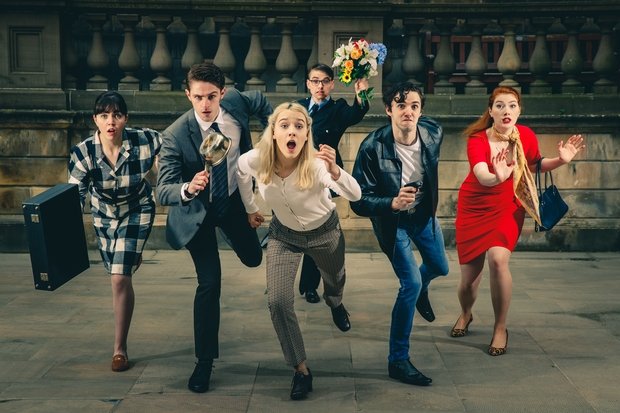Hi Owen great to meet you, can you give our readers some background information on yourself please?
I have been a Playwright for almost 20 years. My plays include ‘Benny’, ‘The Wood’, and ‘Richard Parker’. I have a lifelong love of storytelling and the rhythm of words. How the dialogue sounds to an audience is always as important to me as the strength of the narrative.
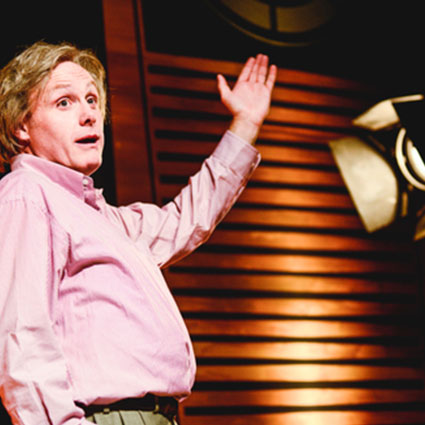
The play I am best known for is ‘Grav’, a one-man show about the life of Welsh cultural and sporting icon, Ray Gravell. This year saw ‘Grav’ complete its 100th performance and counting.
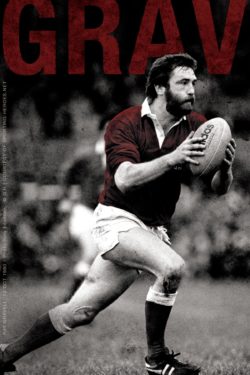
I grew up on a farm in Mid Wales where my parents still live and work. I now live in Tongwynlais on the edge of Cardiff. I am married to Amelia, and we have twin daughters, Sofie and Brooke. I love swimming and running and, for my sins, I am a fanatical supporter of Tottenham Hotspur.
So, what got you interested in the arts?
The urge to write was always there. My earliest inspiration was my Primary School Headteacher at Bronllys Primary School, Mr Dave Cooke. He was also a writer and would occasionally play us a radio play he had written. I was transfixed by the idea that something you had written could entertain people. This was where the idea of being a writer took root.
I went to a secondary school where drama wasn’t taught and with no history of school shows. One day I asked the Head if I could write a play and put it on. The result was a rather strange effort called ‘Where Have All the Foxes Gone?’. It was staged as part of the Christmas concert and the reception to it, as well as the buzz of writing dialogue for actors, was instantly addictive.
Poetry was my first love, and I had some poems published whilst at school. I won some prizes for my writing at local eisteddfods. In my recent writing I feel I am returning to my poetic roots, and my new play, ‘West’, is certainly the most rhythmic and lyrical play that I have written.
It wasn’t until I was living in London that I had the confidence to stage a play professionally. One day I rang all the Pub Theatres in the phone book pretending I was a successful writer looking for somewhere to stage my new play. The Hen and Chickens in Highbury and Islington offered me a weekend in December 2003 and the result was my first play, ‘The Dead of Night’.
Your background is in education. I believe you left teaching to work full time as a writer? This must have meant some risk for you in terms of you career, why did you feel the need to make this move?
I was a Head of Drama in various schools for almost 20 years and I thoroughly enjoyed the job. I still do some Freelance teaching at venues such as Welsh College. But, in my own life, as with so many other people, there had been a few reminders that your time is finite, and that if there is something you really want to do then sometimes you just have to go for it. Carpe Diem. I thought about making the leap for many years, and felt I had enjoyed enough success to encourage me to go for it. But yes, it was a huge decision and one that I didn’t take lightly.
Playwriting is my passion. It is the job I have always wanted to do. I wanted to give myself the opportunity to see how good a writer I could be if I devoted myself to it. So far, the decision has proved to be the right one. In the past year I have written two new plays, ‘West’ and ‘The Night Porter’. ‘The Night Porter’ is a life-long ambition, a good old-fashioned ghost story in the vein of ‘The Woman in Black’. I am delighted that the Arts Council of Wales have granted me a large research and development grant to bring the play to life in January 2020. We have an amazing team lined up I can’t wait to bring a chill down the spine of Welsh theatre very soon.
You have successfully written plays based around the lives of Benny Hill and the Welsh Rugby player Ray Gravell. How do you approach transposing these real lives to the stage?
I have always been fascinated by the lives of real people. The key to bringing a life to the stage is thorough research. There is a huge responsibility in ensuring that you do your homework and present an accurate depiction of your subject matter. When ‘Grav’ was launched at Parc Y Scarlets there was a moment of genuine terror just before Gareth first took to the stage to showcase an extract. The Chief Executive of the Scarlets jokingly said to a room full of dignitaries, ‘well, I hope you’ve got his right, because there’s an awful lot of people in here who loved and knew Ray.’ I went white. Thankfully the reaction to the scene was great.
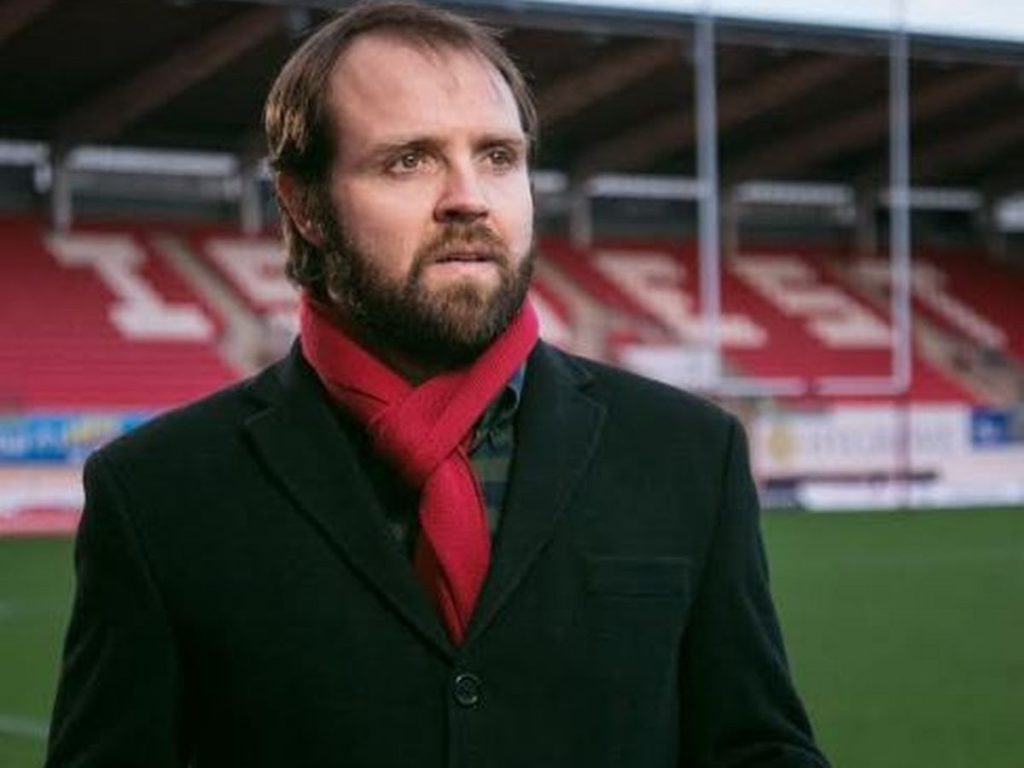
Finding the voice of a person is crucial. This comes from watching all that you can, and meeting people who knew what they were like. Ray’s widow Mari and his daughters Manon and Gwennan were incredibly supportive. The trust they placed in me to do justice to someone who was so loved by them personally was the primary thought kept at the forefront of my mind.
With Ray Gravell it was easier in that he was a well-loved figure. I chose Benny Hill precisely because he is more of a marmite figure. I wanted to get under the skin of a more divisive character, and to explore the impact of society changing around a person. I have always been interested in the lives of old comedians. With Benny Hill I was intrigued by how a man who was the most famous comedian on the planet for a time had become airbrushed out of popular culture. There was some hostility when the play was first unveiled, but thankfully this dissipated when people saw the play, and Liam Tobin’s skilful central performance as Benny.
I am just about to start writing a brand-new play about another much-loved Welsh icon. The team behind it are excellent. It is somewhat under wraps at the moment so watch this space.
You frequently work with the same collaborators, Peter Doran, Artistic Director at The Torch Theatre and most notably the actor Gareth John Bale. How does this relationship work?
On a personal level we are all good friends with a lot in common, but more importantly there is a huge amount of trust between us. That is essential. As a writer you have to be prepared to hand over your work to a creative team who may well suggest cuts and alterations you may or may not agree with. If you have an open and honest relationship, then this is far less painful. I have worked with people in the beginning of my career who would put a line through writing I had spent hours pondering and shaping. This never gets easier, but if you trust the people share the same vision and passion for the project then these decisions become much easier.
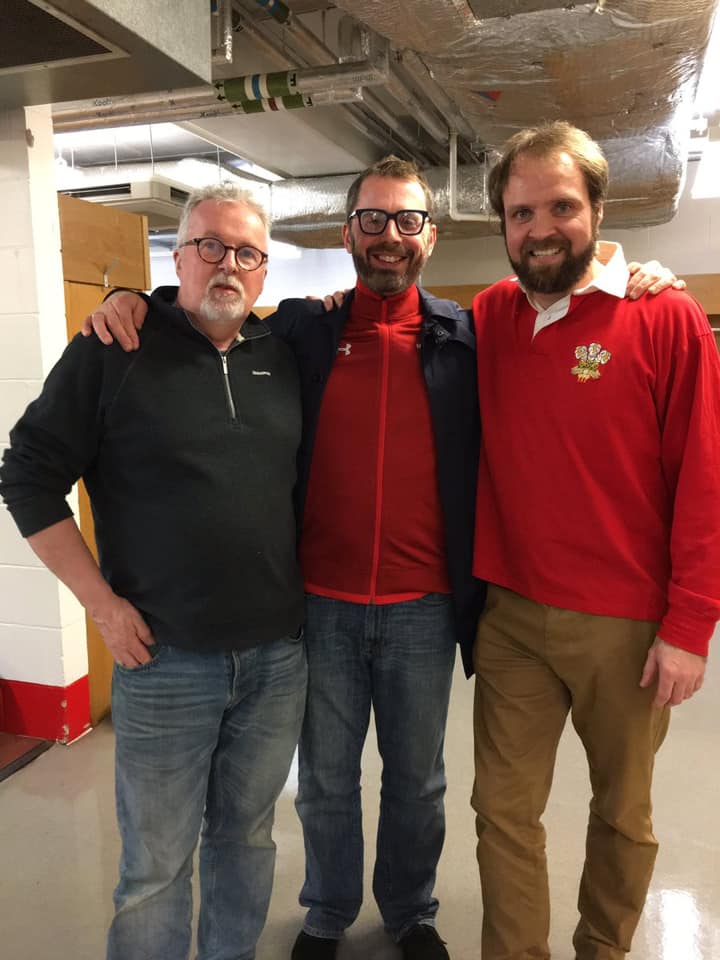
The journey we have been on as a creative team has been incredible, taking us from an initial conversation about ‘Grav’ at the Torch, to New York and our performance this year for the Welsh Rugby team. I can honestly say that throughout this process we have never had a cross word. We all believed in the project and each other. Peter and I went on to work on ‘The Wood’, a play commemorating the Battle of Mametz Wood in World War One. I was incredibly proud of this play and I hope that Peter and I will collaborate on another project in the near future.
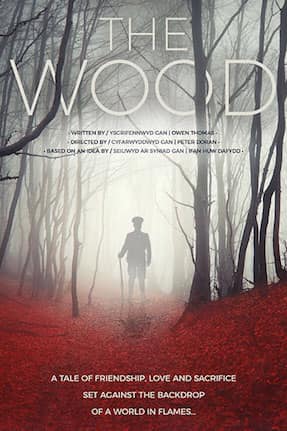
Gareth and I have worked together for over a decade. We were first introduced through the excellent Script Slam at the Sherman Theatre. I had a 10-minute play called ‘The Window’ in the final and so was randomly paired with Gareth as the director. We hit it off immediately, and our relationship has seen us work on a wide range of projects. He is a very skilled director as well as actor, and we complement each other perfectly in the rehearsal room. My family often joke about how often I ring him. Usually once a day, often more. We have lots of plans for the future as Bale and Thomas, and are shortly heading out to the United States with a new play.
Get the Chance works to support a diverse range of members of the public to access cultural provision. Are you aware of any barriers to equality and diversity for either Welsh or Wales based artists?
Encouraging diverse voices to feel empowered to share their stories on stage is key to this. People from all walks of life who live in 21st Century Wales need to feel confident enough to share their individual stories and experiences. We live in strange and somewhat divisive times at the moment. Theatre has always had the ability to hold a mirror up to society and pose questions. In my opinion the importance of cultivating awareness and understanding of other people’s lives and journeys has rarely been so relevant. New plays by diverse voices can play a key role in inspiring discussion, generating understanding and engineering social change.
There are a range of organisations supporting Welsh and Wales based writers, I wonder if you feel the current support network and career opportunities feel ‘healthy’ to you?
Generally, yes, but there are a few areas where there could be some improvement. I developed as a writer through opportunities such as Script Slam at the Sherman Theatre, Cardiff.
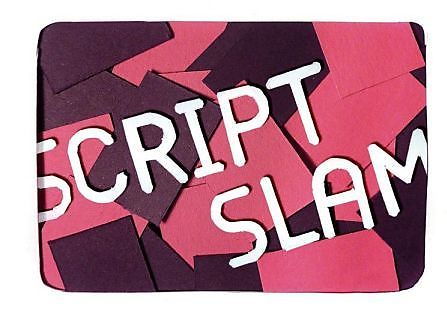
I think there is room in Wales for more events like these for up and coming writers. Writing is a very insular activity, and the chance to see something you have written actually performed on stage is incredibly important in your development. Seeing actors perform your story and hearing your dialogue spoken aloud, as well as having an audience respond to your work, is key to helping you find your style and voice. These early opportunities were fundamental in teaching me how to craft dialogue, and introduced me to some of the most important people in my writing career.
If you were able to fund an area of the arts in Wales what would this be and why?
Funding for youth provision is essential. Growing up I never had access to Youth Theatre or drama lessons. Having taught the subject for so many years, I fully understand the benefits that drama can have on a young person’s life. I have set up my own Youth Theatre in Tongwynlais which is great because I also get to teach my own daughters. There are about 25 members at present, and to see the growth and development in them over the course of the first year has been really exciting. It is essential for the lifeblood of our industry that we nurture our future performers and equip them with the transformative skills that performance can provide. It is essential that drama continues to empower and embolden young people.
Can you tell us about your writing process? Where do your ideas come from?
Ideas come from a range of sources. I have always enjoyed people watching, and indeed was inspired to write ‘The Night Porter’ after glimpsing a haunted looking man sat behind a hotel front desk through a window on a gloomy night in Edinburgh. Sometimes, as with ‘Grav’ or ‘The Wood’ I am lucky enough to be approached. But it has to be something I am going to enjoy researching or something I am able to give my own unique slant. I will often research a play for ages before I start writing, building up a thorough knowledge of the subject in my head.
For ‘The Night Porter’ I wanted to properly get under the skin of how to make people scared and so I enrolled in some night classes on Ghost Stories in Literature at Cardiff University taught by the fantastic Dr Juliette Wood. Through that academic process I was able to improve my understanding of the genre, and this will hopefully add to the scream count in the audience.
I always begin a new play by free writing, getting a load of ideas down on the screen before saving it and leaving it for a week or two. I then re-read and delete the vast majority, but in there I often find the elements I want to develop and expand. I draft and redraft many times until I am satisfied. ‘West’ has undergone five drafts, with ‘Grav’ it was many more. I always try to hear an early draft spoken aloud having long understood that something might look great on the page but sound awful when spoken aloud. Failing that, I read it to the dog in the shed.
Can you describe your writing day? Do you have a process or a minimum word count?
I tend to be at my most productive first thing in the morning. I get up early and go for a walk or a run to clear my head. Then I make a pot of tea and head to the shed for 9. I tend to keep going until ‘The World at One’. The afternoon is often spent reading, researching and editing.
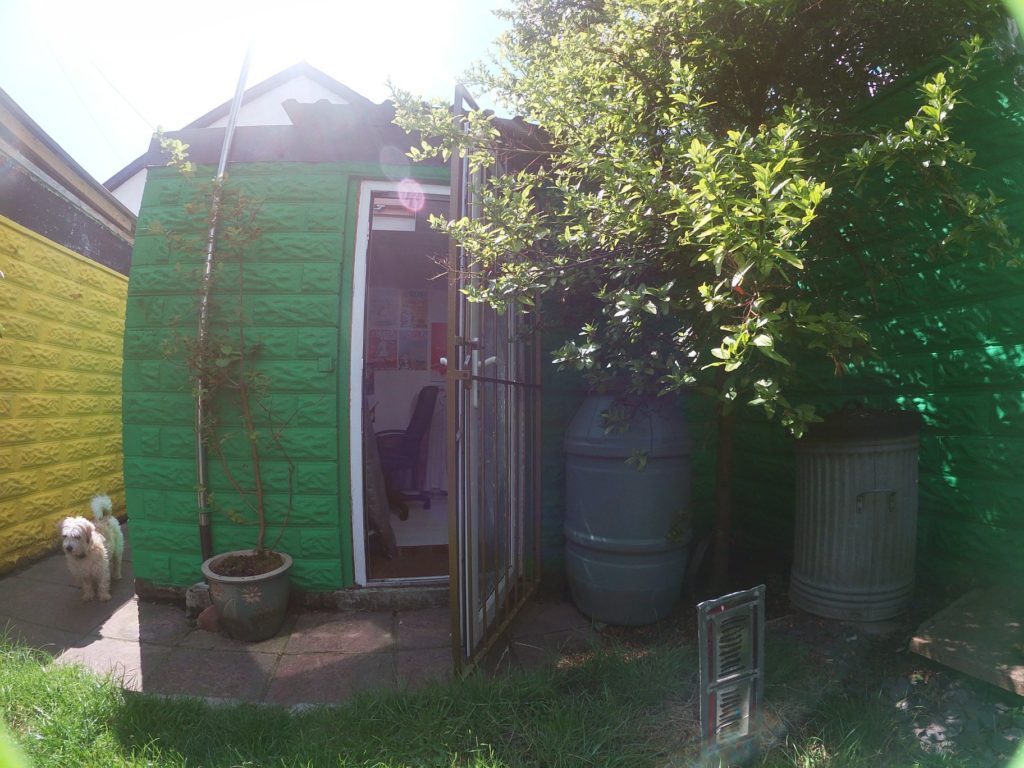
Music is very important, and Spotify is a godsend. The right mood can be created by who you have accompanying you in the background. Richard Hawley is one of my go to artists for this. His lyrics and music are very inspiring, and his latest album, ‘Further’ is just beautiful.
I used to set myself very strict word targets, but after a while I found I was getting more concerned with the number of words I was writing than the quality of them. As long as I leave the shed with a scene or some dialogue that didn’t exist before I went in there then I am happy. A good day could be one page or five pages – it is the quality of the writing that is important.
Is there a place you go to write?
I am lucky in that I have a shed at the bottom of the garden. It has a desk, a chair, bookshelves and pictures all over the wall. I like to be surrounded by postcards, paintings, and photographs, for inspiration. There is no WIFI in the shed which is very important. With a good WIFI connection it is very easy to disappear off into a digital rabbit hole instead of actually writing.
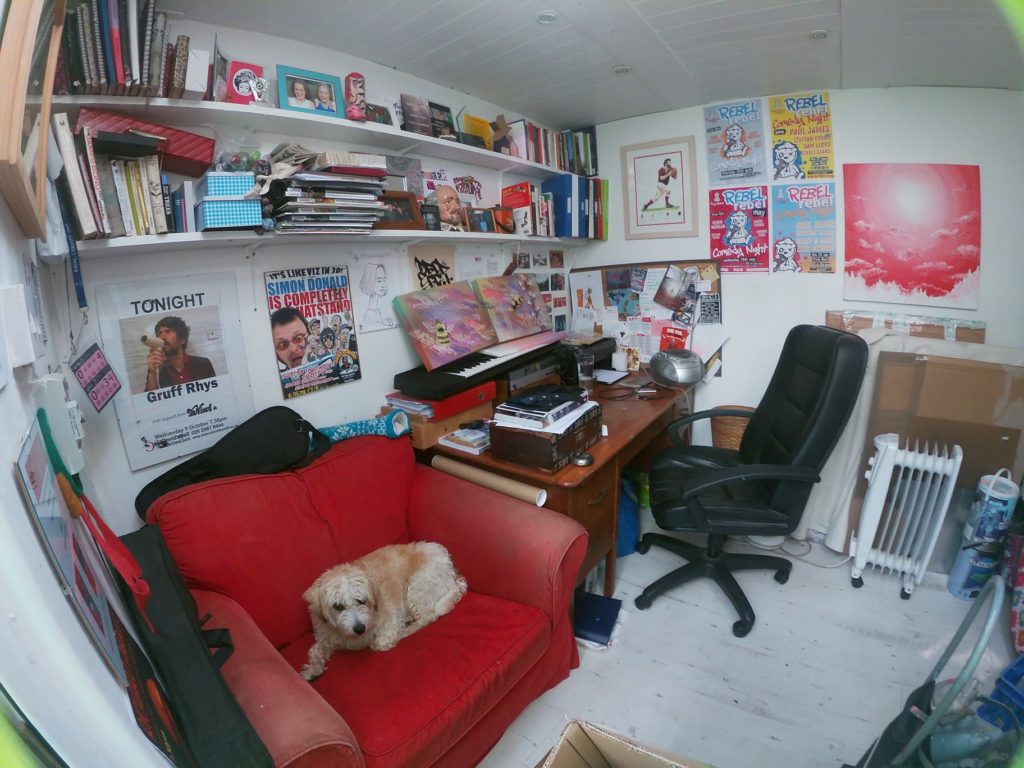
If I want company then the Park and Dare in Treorchy or Chapter are both great places. But mostly, and fuelled by a steady stream of tea, I am content to lose myself for hours in the shed.
What excites you about the arts in Wales?
I am currently working for ‘Pick of the Fringe’ at the Edinburgh Festival. It is so exciting to see such a wealth of terrific Welsh companies showcasing exciting, innovative work across the city. Companies like Dirty Protest, Clocktower and Volcano, to name but a few, are just superb.
My wife is a graffiti artist and spoken work performer called Amelia Unity. She is part of a collective called ‘Ladies of Rage’ who are working hard to address the lack of opportunities for female performers in Hip-Hop, grime, drum & base etc. To see how inspired and empowered they are as a group, including firing up the imagination of my own teenage daughters, is terrific.
Gareth Bale and I have recently set up ‘Rebel Rebel Comedy’, a monthly comedy night at Tiny Rebel in Cardiff. I’m really enjoying getting to know the stand-up comedy scene in Wales, and through our wonderful MC, Steffan Evans, we are being introduced to the huge depth of talent that is out there. Stand-up comedians are fearless performers and I love watching them work.
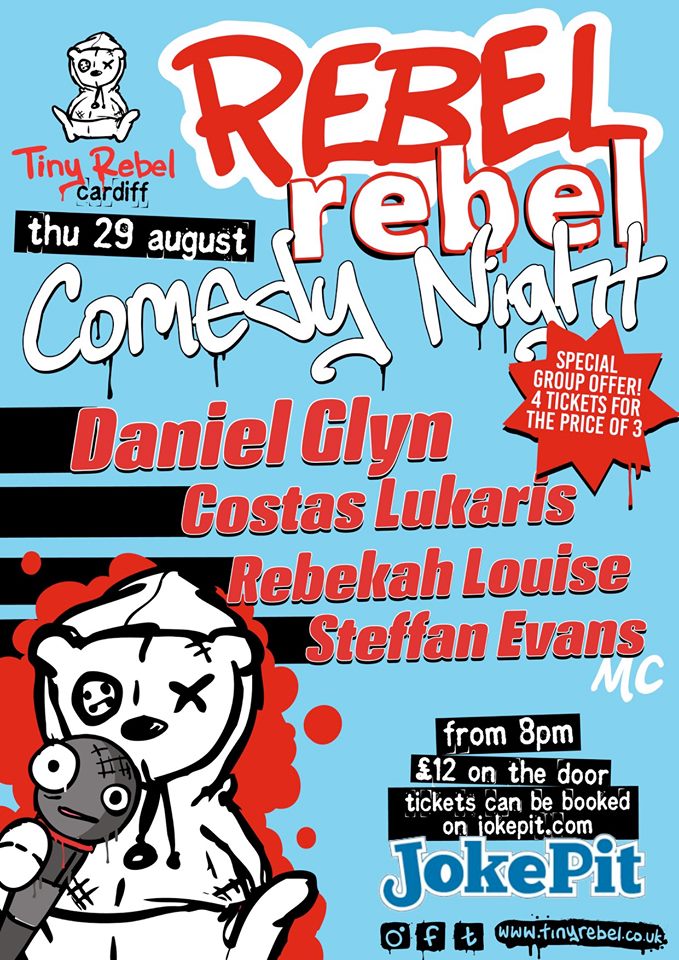
Music wise, I am always in awe of Gruff Rhys. His career is so inspiring and organic. I am always excited to see what he does next. From his very early days he has yet to record an album that I haven’t loved, and his imagination is something I am very envious of. To work with him in some capacity is a long-term ambition of mine. That would be a dream come true.
Finally, after the incredible impact of Rachel O’Riordan at the Sherman, I am very excited to see where the newly appointed Artistic Director, Joe Murphy, takes the theatre to next.
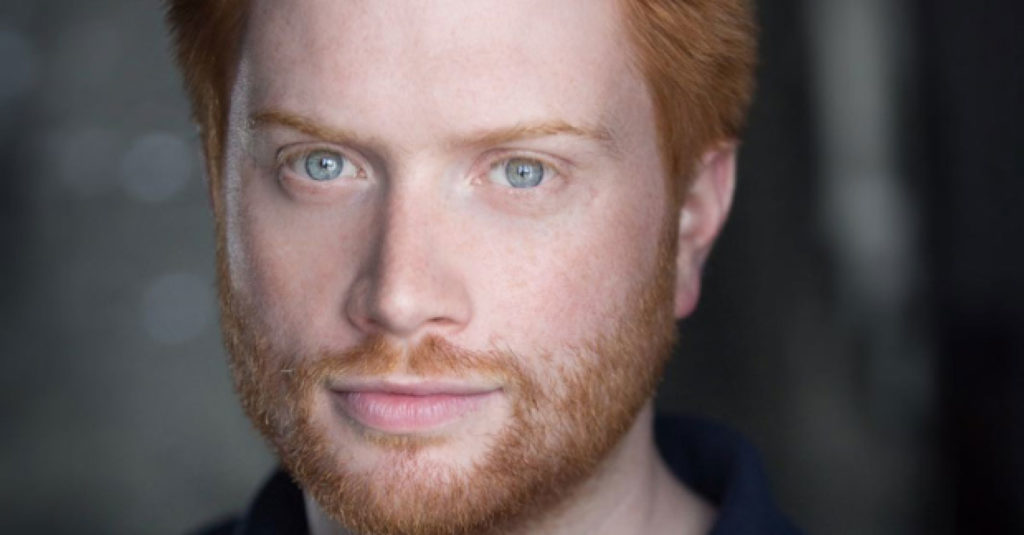
What was the last really great thing that you experienced that you would like to share with our readers?
I grew up in the Britpop era and have always loved going to gigs. I am a big fan of 6 Music and recently happened to hear ‘Kebab Spider’ by the Sleaford Mods. I fell in love with it and them on the spot, and went with my wife to see them at Cardiff University earlier this year. On stage were two men in their mid-40’s, one with a lap top and one with a microphone. It was the most unbelievably visceral, and exciting live experience I have had in years. To lose yourself in a crowd and feel the joy of being in a mosh pit was something I thought I had left behind long ago. I am going to see them again in London in November and I cannot wait. Jason Williamson is far and away the best front man I have seen in years, and I would urge you to check out their documentary ‘Bunch of Kunst’ if you want to know more about them.
And finally, I believe you are about to have your new play ‘West’ premier in America. How do you think American audiences will react to your work?
Last year we were invited to the North American Festival of Wales in Washington DC with ‘Grav’. The play was well received and so I was asked to write something original for this year.
‘West’ explores the lives of the first Welsh settlers who went over to America. It is written largely in verse and stars Gareth Bale and Gwenllian Higginson. On a superficial level it is a love story between two people who make the decision to uproot their lives. On a deeper level I wanted to explore the theme of immigration, and to hopefully show the audience that we all originated from different places. I am very proud of it, and delighted it will premiere in America.
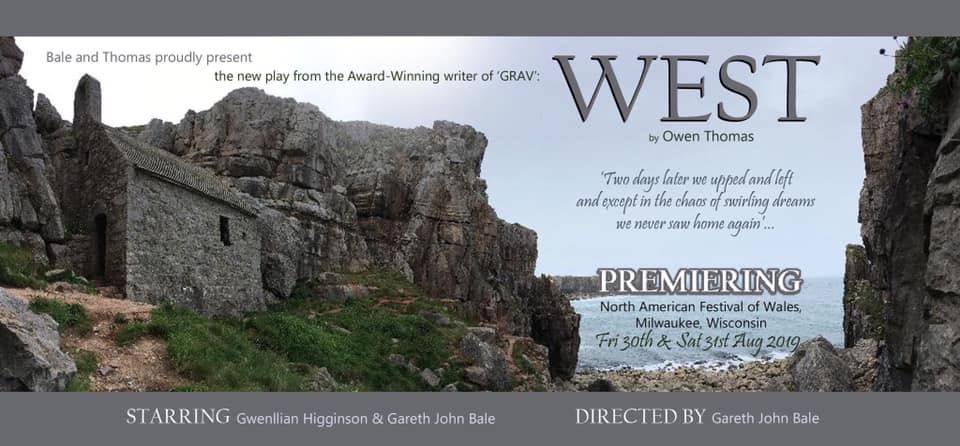
Many thanks for your time
You are very welcome.

 (3 / 5)
(3 / 5)

 (4 / 5)
(4 / 5)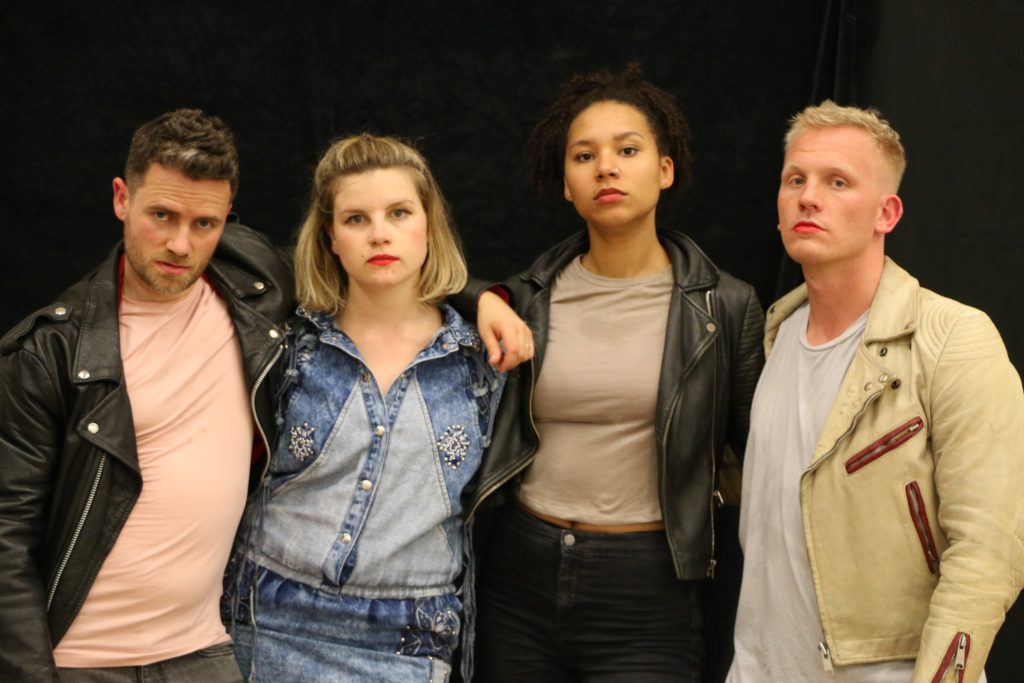
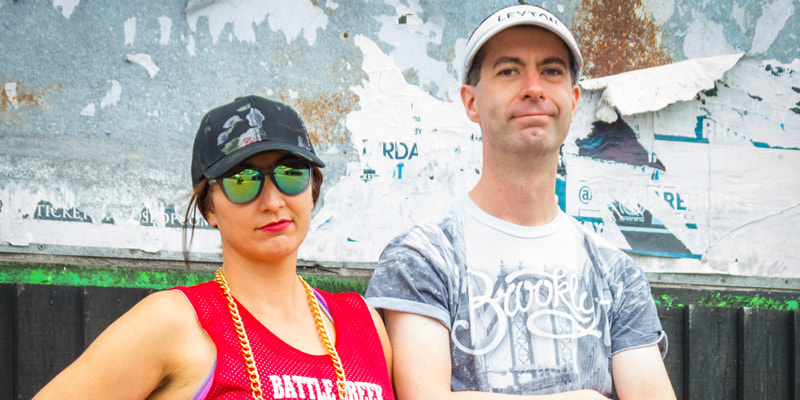
 (5 / 5)
(5 / 5)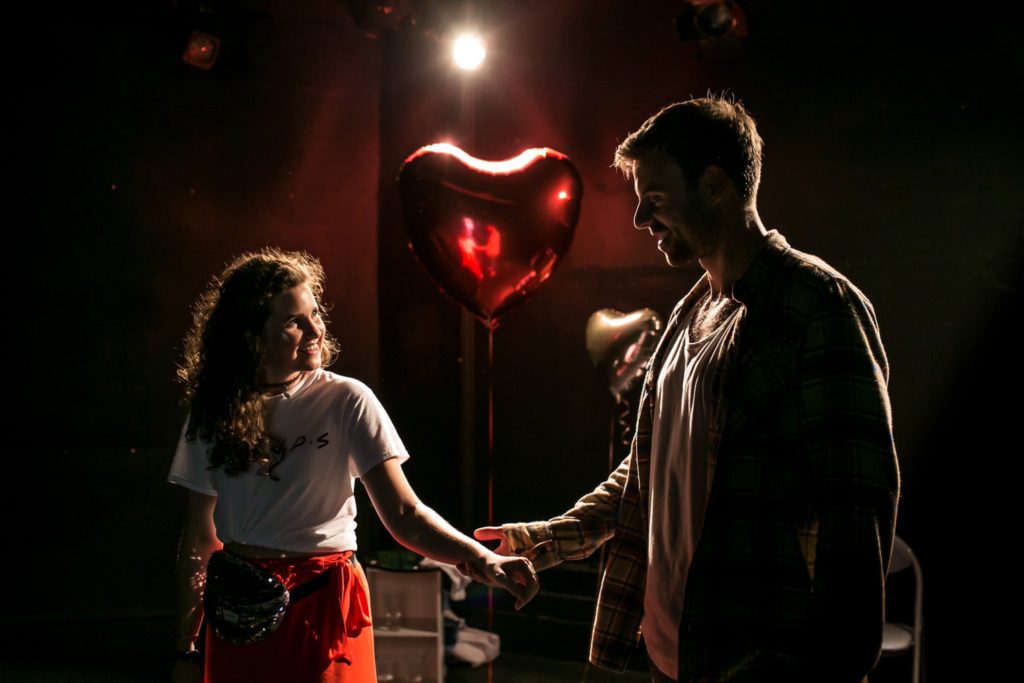
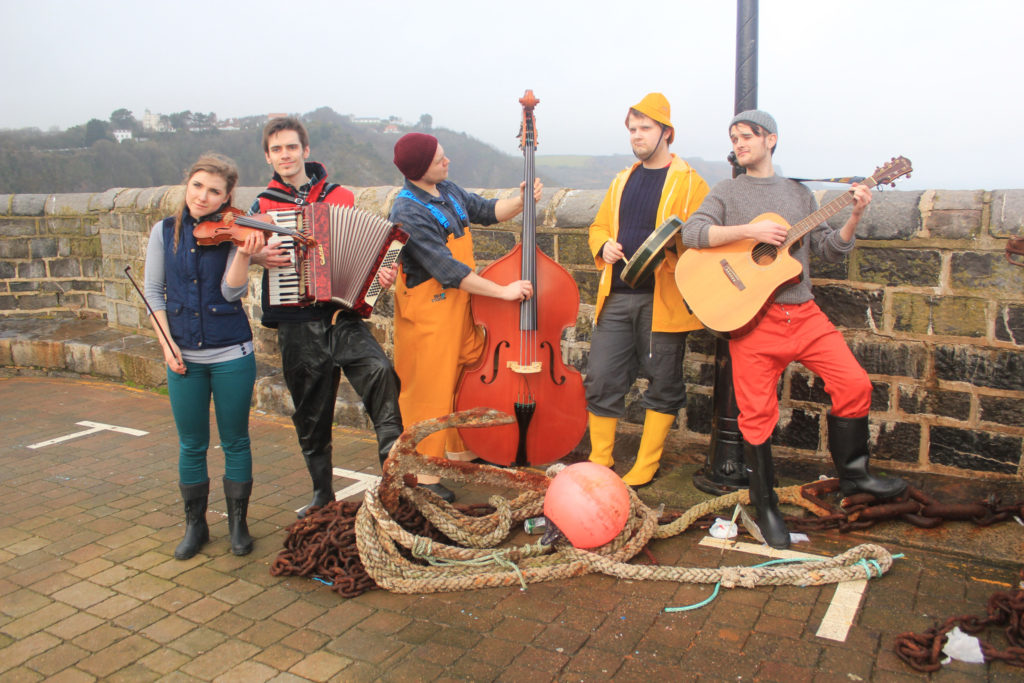
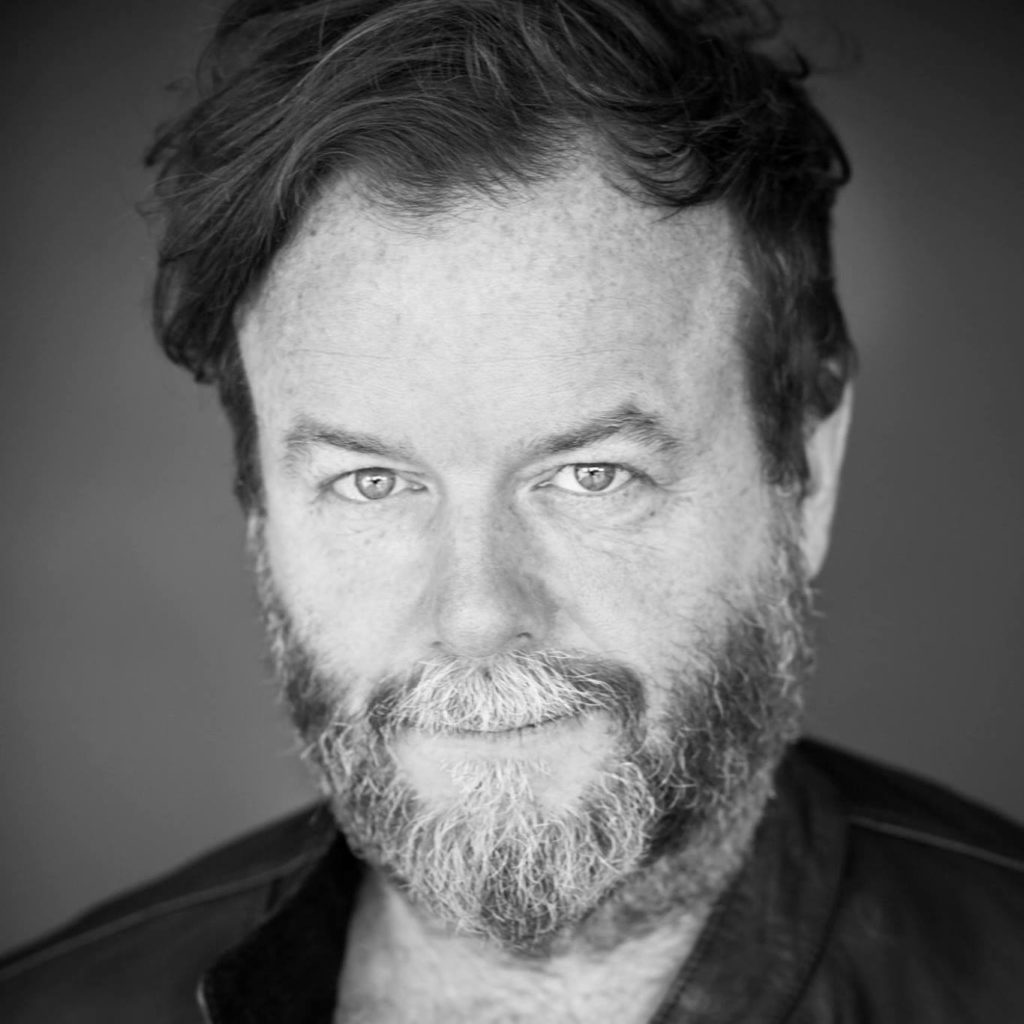
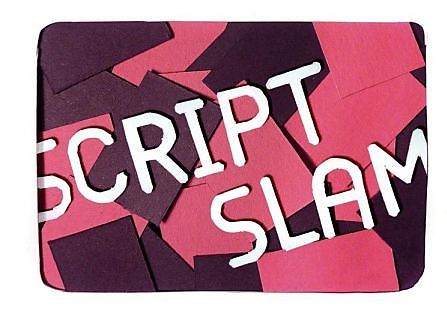

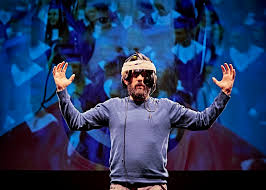
 (2 / 5)
(2 / 5)